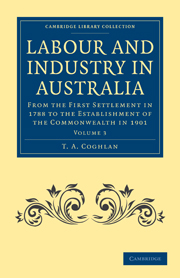 Labour and Industry in Australia
Labour and Industry in Australia Published online by Cambridge University Press: 07 October 2011
NEW SOUTH WALES
The year 1872, though it was marked by no new land legislation, was the beginning of a new era in the history of the land question in New South Wales, for in that year alienation of the public estate began to take place on a vast scale.
A very few years' experience of the working of free selection before survey was sufficient to convince the squatters that it would be necessary for them to purchase a large portion of their runs, if they wished to hold their leases with safety, as almost from the passing of the Robertson Land Act in 1861 there had been a class, whose numbers rapidly increased, which saw in free selection a powerful means of victimizing the leaseholders. It was not until 1872 that the squatters were able to defend their interests in the way they desired. In that year the commercial depression, following the crisis of 1866, completely passed away; money, which had previously been lacking, became plentifully available for investment in land and the banks willingly lent themselves to strengthening the squatters' position against the predatory selector. A change in the policy of the Government in regard to auction sales also gave the squatters facilities for acquiring land that they had not previously enjoyed.
The selection of land under conditions of residence was the method of purchase most favoured by the Governments that administered the Act during its early years, and sales of land by auction, although revenue was badly needed, were not therefore encouraged.
To save this book to your Kindle, first ensure [email protected] is added to your Approved Personal Document E-mail List under your Personal Document Settings on the Manage Your Content and Devices page of your Amazon account. Then enter the ‘name’ part of your Kindle email address below. Find out more about saving to your Kindle.
Note you can select to save to either the @free.kindle.com or @kindle.com variations. ‘@free.kindle.com’ emails are free but can only be saved to your device when it is connected to wi-fi. ‘@kindle.com’ emails can be delivered even when you are not connected to wi-fi, but note that service fees apply.
Find out more about the Kindle Personal Document Service.
To save content items to your account, please confirm that you agree to abide by our usage policies. If this is the first time you use this feature, you will be asked to authorise Cambridge Core to connect with your account. Find out more about saving content to Dropbox.
To save content items to your account, please confirm that you agree to abide by our usage policies. If this is the first time you use this feature, you will be asked to authorise Cambridge Core to connect with your account. Find out more about saving content to Google Drive.